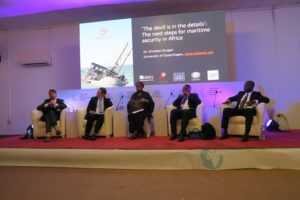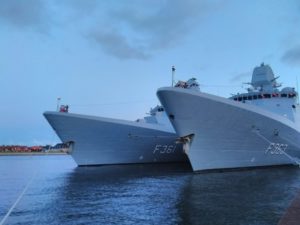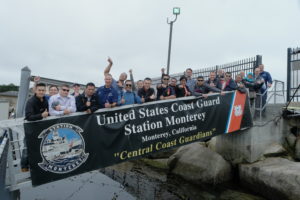The event titled “After the Blue Turn: The politics of maritime spaces” brought together a range of scholars based in Copenhagen on the 1st of November to discuss how thinking from the sea bring attention to new political spaces of liminality, such as ports. These are new sites of politics and contestation and raise questions of connectivity, authority and power. 6 presentations addressed this theme. I was presenting my recent chapter on maritime security spaces at the event.
Author Archives: admin
Department visits partner university in Tokyo
Over the years the University of Copenhagen and the University of Tokyo has developed a close partnership. To strengthen the partnership my Department is visiting our colleagues from the 23rd to 26th of October.
Part of the visit is a meeting on research collaboration as well as a public forum on international cooperation. As part of the forum I will discuss burden sharing and collaboration at sea looking into the fight against piracy as well as other blue crimes, such as smuggling and environmental crimes.
UNODC Expert Meeting in Mauritius
From the 14th to 18th of October the UN Office on Drugs and Crime’s Global Maritime Crime Programme (GMCP) is hosting its Legal Expert Network meeting in Mauritius. Part of the meeting is to review the forthcoming 3rd edition of Maritime Crime: A Manual for Criminal Justice Practitioners. This concerns in particular new chapters on ship rider provisions, on submarine cable protection as well as stateless vessels.
At the meeting I will be leading a brainstorming exercise on Transnational Maritime Environmental Crime drawing on work conducted in the Safeseas network new project Transnational Organised Crime at Sea (TOCAS). Arguing for distinguishing between three “blue crimes” (crimes against mobility, criminal flows, and environmental crime), I discuss illicit waste trade, pollution crimes, illegal extraction, and other damages to the marine environment and the respective legal regimes addressing these. Part of the discussion will be how to deal with the complexity of the environmental crime at sea regimes.
Maritime Security Conference in Nigeria

To revitalise the African discussion on maritime security the government of Nigeria is organising a Global Maritime Security Conference held in Abuja from the 7th to 9th of October. At the event I will give one of the keynote speeches, discussing different reasons for why there continues to be a lack of attention for the sea, investigating in particular neo-colonial arguments and the exploitative tenets in the blue economy project.
UNODC training week in Stellenbosch
From the 24th to 27th of September I will be attending the training week of UNODC’s Global Maritime Crime Programme (GMCP), held in Stellenbosch, South Africa. At the event I will deliver two training sessions. The first one looks at Environmental Crime at Sea, and is largely a scoping exercise, asking how we should conceptualise environmental crimes in the context of ocean governance and the anthroprocene. The second session focuses on Maritime Security Governance drawing on the SafeSeas Best Practice Toolkit and the governance model presented there as well as the relevance of maritime security strategy. I will also chair a public roundtable jointly organised with SIGLA. The roundtable is titled “Caught between AIMS-2050 and Lomé: Why do African states still not care about the seas and oceans?”. It features a range of South Africa based maritime security experts and investigates the reasons for the lack of attention in African states for ocean governance and maritime security.
IR scholars meet in Sofia
This week the European International Studies Association, the largest European association for international relations research holds its annual meeting in Sofia, Bulgaria.
I am attending the event for three days, mainly in the capacity of the co-chair of the International Practice section, I have been organising together with Alena Drieschova (U Cardiff). I will also be representing the European Journal of International Security at the event.
Presentation on Maritime Domain Awareness

This week the industry fair MAST Northern Coasts was held in Copenhagen, bringing a range of international naval and industry representatives to the city. The exhibition was accompanied by a small conference at which I had the pleasure to give a talk on maritime domain awareness (MDA). Drawing on the research on MDA in different regions, I looked into the questions of what is difficult in implementing MDA and why we don’t see the emergence of a Baltic regional MDA structure.
Term starts in Copenhagen
This week the autumn term starts at the University of Copenhagen. Over the next 14 weeks I will be teaching two courses, both at masters level, with 170 students in total.
The course Concepts and Methods of International Relations is a mandatory post-graduate level survey of the discipline of IR from the perspective of key concepts that have driven the debates. The course starts out from foundational discussion of concepts of knowledge, theory, concept, critique and methods. This creates the basis for investigating a set of influential concepts in the discipline, including structure, modernity, rationality, norms, culture, discourse, practice, space, technology, Anthropocene, and queer. The course concludes with a discussion of what to do with these concepts.
The second course “Knowledge Production and Evaluation” is a core subject in the Security and Risk Management master programme. It is broadly structured around literature from social theory, anthrpology and science and technology studies interested in how knowledge is produced in practice and how it is linked to politics and decision making. The course revisits core frameworks, such as epistemic communities, and actor-network theory and then a share framework for the study of epistemic practices is developed and tested through exercises.
Short article on maritime security capacity building
What are the challenges in governing maritime security? How can the capacity gap closed through capacity building projects? What guidelines can make such work more effective? These are the questions that I address in a new short article published in the Seychelles Research Journal. I discuss the key insight developed in our last research project which were published as a best practice tool kit titled “Mastering Maritime Security”.
Maritime Security training Course in U.S.

From the 21st to 27th of July I attended a training course on Civil-Military Approaches for Maritime Security organised by the Institute for Security Governance, in Monterey, CA. The course is part of the US capacity building work on maritime security and taught since 2008. As part of the course I delivered a module on maritime domain awareness, relying on my 2015 article on Maritime Domain Awareness in Southeast Asia as well as the results of the SafeSeas Best Practice Toolkit and the model of maritime security governance it outlines. I also reviewed the core ideas behind Maritime Domain Awareness, and discussed with the participants the core hindrances to information sharing.